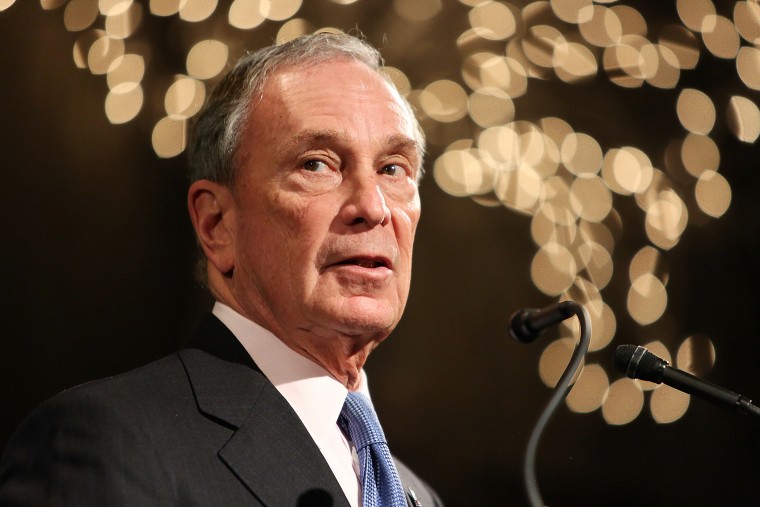Kevin Sheekey ran Michael Bloomberg’s New York City mayoral campaigns in 2001 and 2005. He is considered the former mayor’s top political adviser. And in the aftermath of the New Hampshire primary, he is fueling rumors behind the $39 billion question in presidential politics: Will Michael Bloomberg run for president?
As he did in 2008, Sheekey is pushing the issue. Early Wednesday morning, with the results of New Hampshire still sinking in, Sheekey tweeted a New York Post story making the case for a Bloomberg candidacy.
“Sanders, Trump wins could open door for Bloomberg,” the headline reads.
One thing is clear, the campaign for a campaign, is on.
A full week ago, Bloomberg pollster Doug Schoen wrote up his views for The Wall Street Journal. “60% of Americans told Gallup in September that the Republicans and Democrats ‘do such a poor job’ representing them that they want to see a third major party emerge. That’s up from 40% when the question was first asked in 2003. Who fits the bill? Michael Bloomberg, a centrist with a clear (and arguably unique) record in business as an entrepreneur and in politics as a three-term mayor of New York,” wrote Schoen, who was also a one-time pollster for President Bill Clinton who is now one of Bloomberg’s closest political advisers.
RELATED: Former NYC mayor inches closer to independent 2016 bid
Before primary voters in New Hampshire went to the polls, Bloomberg himself went on the record with The Financial Times saying he was considering an independent bid for the White House. To do it, he will need to move fast. Ballot access deadlines for independent candidates loom — most notably in Texas where petitions can begin to be circulated on March 1, with a deadline of May 9 to get the necessary 79,939 signatures.
Forbes magazine puts Michael Bloomberg’s net worth at $39 billion. A New York Times report from late January cited Bloomberg allies as saying the businessman would be willing to spend at least $1 billion of his own money on a presidential campaign. Using his own money to satisfy his political ambitions is a part of Bloomberg’s legacy in New York.
When the life-long Democrat turned Republican first ran for mayor in 2001, he spent $74 million on what ended up being a narrow win over Democrat Mark Green. For his 2005 re-election bid, the mayor upped the stakes by spending $85 million of his own money. He trounced his opponent Fernando Ferrer that year by a 20-point margin.
That big win was almost Bloomberg’s last political campaign. A 1993 voter referendum installed term limits for elected officials in New York City. Under the rules, Bloomberg would not have been eligible to run for a third consecutive term in 2009. But in 2008, the City Council of New York voted 29-22 to change the rules, allowing city officials to serve three consecutive four-year terms. That vote brought with it plenty of controversy at the time. Bloomberg’s ultimate successor as mayor, then-New York City Councilman Bill De Blasio, decried taking the term-limit decision away from the voters of New York. “We are stealing like a thief in the night their right to decide the shape of their democracy,” he said.
With the path clear to run once more, Bloomberg spent a record setting $108,371,685 of his own money eking out a win over former New York City Comptroller William Thompson. By this point in his political career, Bloomberg was an Independent, having made the switch in the middle of his second term as mayor.
A source familiar with Bloomberg’s thinking says nothing that happened in New Hampshire was discouraging to a possible bid. A decision from the former mayor is likely to come in early March, as that is when the petition process would need to start in earnest. Bloomberg and his advisers will be monitoring primary results until then. Should Hillary Clinton emerge as the likely Democratic nominee, that development would not necessarily mean Bloomberg won’t run. Should she be seen as a weak general election candidate who had to move far left to stave off a Sanders challenge, Bloomberg would still consider an independent run, the source familiar with his thinking added.
It is his independent brand that his inner circle clearly feels could be Bloomberg’s path to 1600 Pennsylvania Avenue. But in a campaign cycle where voters are expressing frustration with Wall Street influence in politics and the perception of a rigged system, Bloomberg will have to overcome some perception issues of his own: One of being a billionaire businessman closely associated with the financial sector and a politician who benefited from a mid-game change to the rules that allowed him to hold on to power.
